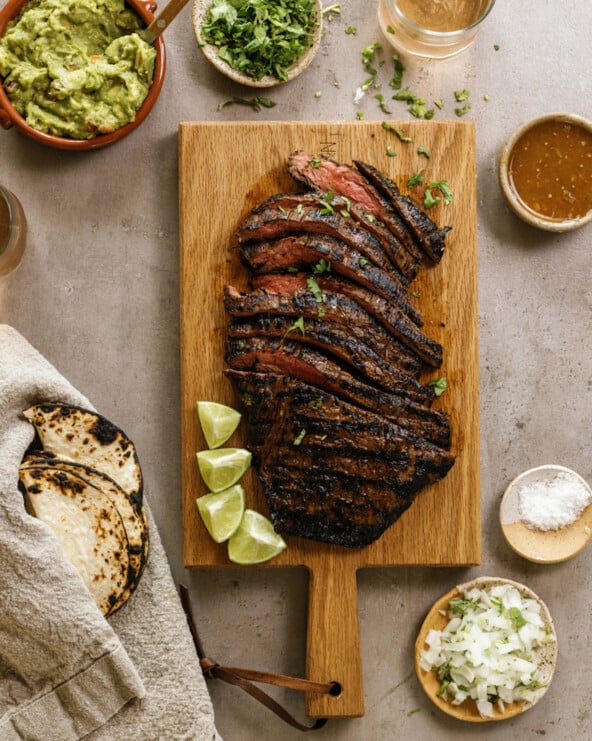Steak for breakfast, lunch, and dinner? Welcome to the carnivore diet, one of the most controversial and extreme eating plans in the health sphere. This all-meat regimen has sparked fierce debate among wellness enthusiasts. Proponents hail it as a cure-all for ailments while critics warn of its potential health risks. Across the board, this diet has garnered attention from fitness enthusiasts and biohackers to those seeking a radical solution to digestive woes. But as its popularity grows, a crucial question arises: is the carnivore diet safe? We’re diving deep into this exclusively animal-based diet.
- What is the carnivore diet?
- The Carnivore Diet Is (So) Restrictive
- Who started the carnivore diet trend?
- Why is the carnivore diet so popular?
- Potential Health Benefits
- Who Benefits from Eating the Carnivore Diet
- Carnivore Diet Meal Plan
- Why does the carnivore diet not include vegetables?
- Short-Term vs. Long-Term Considerations
- Is the carnivore diet safe?
- A Controversial Choice

What is the carnivore diet?
Also known as the zero-carb diet (or the all-meat diet), the carnivore diet is exactly what it sounds like: an approach that consists entirely of animal products. Devotees consume only meat, fish, eggs, and some animal-derived products—like butter or bone broth. It removes all plant-based foods, including fruits, veggies, grains, nuts, and seeds. Essentially, it’s an extreme (and highly restrictive) form of a low-carb diet. Most wholesome foods are off-limits.
What You Can Eat:
- All types of meat (beef, pork, lamb, poultry, etc.)
- Fish and seafood
- Eggs
- Animal fats (i.e., lard and tallow)
- Bone broth
- Some dairy products (primarily butter and hard cheeses, though some believe all dairy should be excluded)
What You Can’t Eat:
- Fruits and vegetables
- Grains and legumes
- Nuts and seeds
- Plant-based oils
- Sugar and artificial sweeteners
- Most dairy products (especially those high in lactose)
- Any plant-derived foods or additives


The Carnivore Diet Is (So) Restrictive
The carnivore diet is easily one of the most restrictive eating plans available. By focusing solely on animal products, this lifestyle raises concerns about missing essential nutrients (hello, fiber, vitamin C, and various phytonutrients found in plant foods!). Inevitably, it also presents social challenges. Dining out, traveling, and socializing require substantial planning. Sustainability is also an issue—both in terms of personal adherence and environmental impact. It’s also possible that intaking high amounts of saturated fat and cholesterol, without plant-based nutrients, increases your risk of cardiovascular disease.


Who started the carnivore diet trend?
Shawn Baker. He’s an orthopedic surgeon and athlete, who started the carnivore diet trend after he shared his success with it in 2016. He claimed that eating only animal-based foods improved his health, strength, and overall well-being. His book, The Carnivore Diet—along with a growing (and fiercely loyal) online community—propelled the diet into the mainstream. Safe to say, his journey has piqued plenty of curiosity.
Why is the carnivore diet so popular?
It’s the perfect storm of simplicity, shock value, and the allure of quick fixes. From Instagram influencers flaunting their ‘what I eat in a day’—to Reddit threads buzzing with carnivore converts—this primal eating plan has gone viral. And social media can’t stop chewing it over. The carnivore diet is positioned as the panacea for modern health woes, including effortless weight loss. In recent years, it’s gained traction for several reasons.
- Simplicity: In a world of complex diet plans, the carnivore diet is the opposite. Eat meat and drink water (some consume tea and coffee, too).
- Weight loss claims: Proponents report rapid weight loss, especially in the initial stages.
- Elimination of potential allergens: By removing all plant foods, the diet eliminates many common allergens and supposed anti-nutrients.
- Anecdotal success stories: High-profile advocates—including a few medical professionals—have shared stories of improved health conditions.
- Rebellion against conventional wisdom: Of course, this diet challenges long-held beliefs about the necessity of fruits and veggies. It appeals to those skeptical of mainstream nutritional advice.


Potential Health Benefits
Bear in mind that scientific research on the carnivore diet is limited. That said, proponents claim several benefits.
- Improved digestive health: Some report reduced bloating and improved digestive symptoms (possibly due to removing fiber and hard-to-digest plant compounds).
- Mental clarity: Adherents often describe increased focus and reduced brain fog.
- Stable energy levels: The high-fat, moderate-protein nature of the carnivore diet can lead to more stable blood sugar and consistent energy throughout the day.
- Reduced inflammation: By removing potentially inflammatory plant compounds, those with autoimmune conditions report improvements in their symptoms.
- Simplified meal planning: With limited food choices, meal prep is pretty straightforward.


Who Benefits from Eating the Carnivore Diet
Seeking a radical alternative to your health issues? You may benefit from the carnivore diet. Whether you’re grappling with severe allergies/intolerances to plant-based foods, or have an autoimmune condition (that hasn’t improved with other dietary interventions), the carnivore diet might be worth trying. But for most, it’s an outlandish and extreme approach. It cuts out entire food groups and essential nutrients! The diet’s rigid nature is a far-fetched option for the average person.
Discalimer: Due to its potential risks and nutritional imbalances, this intense diet should only be undertaken under close medical supervision—particularly if you have existing health conditions.


Carnivore Diet Meal Plan
Here’s a glimpse into a three-day carnivore diet meal plan that showcases the simplicity—and potential monotony—of this meat-centric approach.
Day 1
- Breakfast: Scrambled eggs with butter and pan-fried bacon
- Lunch: Grilled ribeye steak
- Dinner: Baked salmon with a side of scrambled eggs
Day 2
- Breakfast: Beef liver fried in tallow with a side of ground beef
- Lunch: Roasted chicken thighs (skin-on)
- Dinner: Pan-seared lamb chops
Day 3
- Breakfast: Beef patties topped with fried eggs
- Lunch: Canned sardines and hard-boiled eggs
- Dinner: Slow-cooked beef brisket
Note: Water, black coffee, and unsweetened tea are typically allowed on the carnivore diet.
While this plan demonstrates the diet’s structure, it’s crucial to consult with a healthcare professional before making such a drastic dietary change.


Why does the carnivore diet not include vegetables?
Carnivore diet proponents argue against consuming fiber (a rather polarizing stance!). In turn, all produce is banned. Below is what devotees argue:
- Digestive stress: They claim that fiber—especially in large amounts—can irritate the gut lining and cause digestive discomfort, bloating, and gas.
- Nutrient absorption: Furthermore, carnivore advocates believe that fiber can interfere with the absorption of animal foods’ essential nutrients (i.e., B vitamins).
- Gut bacteria: While conventional wisdom promotes fiber for feeding beneficial gut bacteria, carnivore dieters argue that a fiber-free diet can help reduce harmful gut bacteria overgrowth.
- Evolutionary argument: Proponents often cite the idea that humans evolved primarily as meat-eaters. In turn, our digestive systems aren’t optimized for processing large amounts of plant matter.
- Insulin response: They claim the complete elimination of carbs (including those from fruits and veggies) leads to better blood sugar control and insulin sensitivity.
- Antinutrients: Carnivore diet followers often point to antinutrients in plant foods (like lectins, phytates, and oxalates) as potentially harmful compounds.
It’s important to note that these views on fiber go against mainstream nutritional science, which generally promotes fiber as an essential component of a healthy diet! Most global health organizations recommend consuming adequate fiber for digestive health, blood sugar regulation, and potential protection against certain diseases.
Short-Term vs. Long-Term Considerations
Sure, there might be positive short-term effects from the carnivore diet. But long-term adherence raises serious concerns. If you’re thinking about taking the plunge, consider it as a short-term intervention rather than a lifelong eating plan. Short-term benefits may include rapid weight loss, reduced inflammation, and improved symptoms for certain chronic conditions. As mentioned, excluding plant foods can quickly lead to nutritional deficiencies, altered gut microbiome, and increased risk of certain diseases.


Is the carnivore diet safe?
Like most wellness practices, the answer is nuanced. While some people report health improvements on this diet, it goes entirely against conventional nutritional wisdom. It also lacks extensive scientific studies to support its safety and efficacy. Anyone considering the carnivore diet should approach it with caution and under the guidance of a healthcare professional. For a majority of the population, a balanced diet—that includes a variety of foods from all food groups—is much safer. Not to mention, eating the rainbow is more sustainable, inclusive, and enjoyable!
Carnivore diet adherents argue that animal foods can provide all necessary nutrients, but this claim is disputed by many nutrition experts.


A Controversial Choice
Ultimately, the carnivore diet is quite the provocative choice. It’s a dietary choice that’s as polarizing as it is excessibe. But if we’ve learned anything in the realm of balanced nutrition, it’s that no single approach fits everyone. The key lies in diversity—embracing a wide array of nutrients, flavors, and food groups to fuel our bodies. Balance isn’t about extremes. Nor is it about fads or quick fixes. It’s about finding harmony and ease in what we eat. After all, sustainable health is built on a foundation of variety, moderation, and mindfulness.
As with any radical dietary change, it’s crucial to listen to your body, stay informed about the latest research, and prioritize overall health and well-being.






